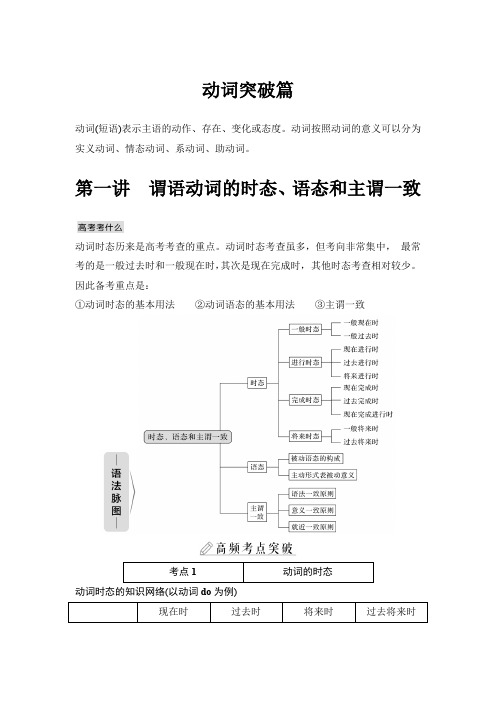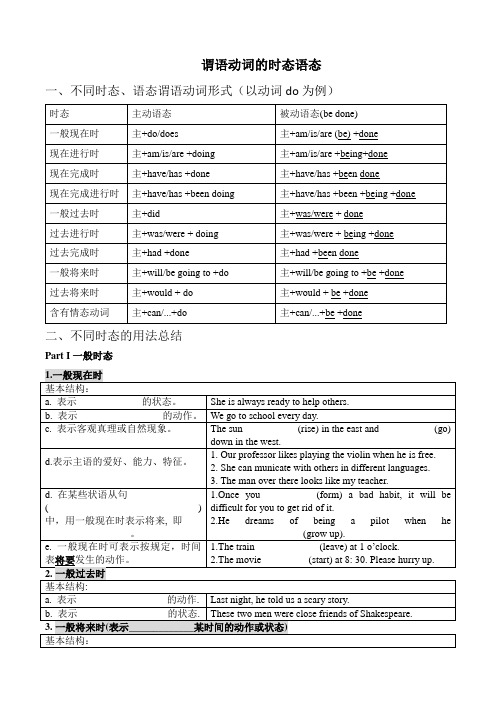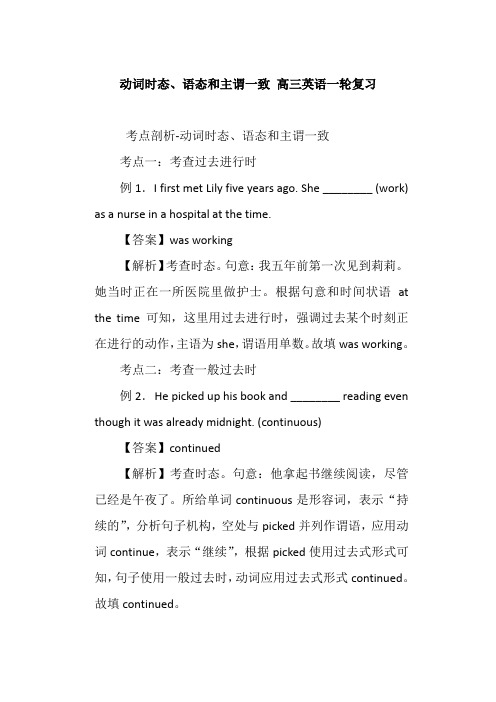高考英语一轮复习 动词的时态及语态讲解
【高考英语一轮复习】第一讲 谓语动词的时态、语态和主谓一致

动词突破篇动词(短语)表示主语的动作、存在、变化或态度。
动词按照动词的意义可以分为实义动词、情态动词、系动词、助动词。
第一讲谓语动词的时态、语态和主谓一致动词时态历来是高考考查的重点。
动词时态考查虽多,但考向非常集中,最常考的是一般过去时和一般现在时,其次是现在完成时,其他时态考查相对较少。
因此备考重点是:①动词时态的基本用法②动词语态的基本用法③主谓一致动词时态的知识网络(以动词do为例)1.一般时态(1)一般现在时①表示经常或习惯性的动作,多用动作动词,且常与表频率的时间状语连用。
We have meals three times a day.我们一日吃三餐。
②表示客观真理、科学事实及自然现象。
The sun sets in the west.太阳从西方落下。
③在时间、条件状语从句中常用一般现在时代替一般将来时。
I’ll write to her when I have time.有时间我会写信给她。
(2)一般过去时①表示过去发生的一次性或习惯性动作或状态。
We often played basketball together.我们(过去)经常在一起打篮球。
②时间、条件、让步状语从句中,若主句用了过去将来时,从句常用一般过去时。
He said he would tell her the news as soon as he met her.他说他一见到她就把这个消息告诉她。
单句语法填空①The 80,000 objects collected by Sir Hans Sloane, for example, formed (form) the core collection of the British Museum which/that opened in 1759.(2020·新高考卷Ⅰ语法填空)②The unmanned Chang’e-4 probe (探测器)—the name was inspired by an ancient Chinese moon goddess—touched (touch) down last week in the South Pole-Aitken basin.(2020·全国卷Ⅰ语法填空)③When/As he asked the villagers on the banks of the river where he could find the legendary (传奇的) artist, they smiled and pointed (point) down the river.(2020·全国卷Ⅲ语法填空)④New methods meant__(mean)that fewer people worked in farming.(2020·浙江卷语法填空)⑤While running regularly can’t make you live forever,the review says it is(be) more effective at lengthening life than walking,cycling or swimming.(2018·全国卷Ⅰ语法填空)⑥Sarah says,“My dad thinks I should take the offer now.But at the moment,school comes (come) first.I don’t want to get too absorbed in modeling.”(全国卷Ⅲ语法填空)2.进行时态(1)现在进行时(am/is/are+现在分词)①表示说话时正在进行或发生的动作,也可表示现阶段正在进行的动作或存在的状态。
高中时态语态归纳总结导学案高考英语一轮复习

谓语动词的时态语态一、不同时态、语态谓语动词形式(以动词do为例)二、不同时态的用法总结Part I一般时态三、被动语态时态语态专练一.画出下列句子(包括从句)中的谓语动词,并写出其时态语态。
1.This afternoon, we had our chemistry class in the science lab.2. She is studying at an American high school for a year.3. My name is Adam and I’m a freshman at senior high school.4. You should encourage your friend to try new hobbies.5. There, a boat will take you to stay with a local Urus family on an island for three days.6. I’ve been studying English since primary school.7. The team that Lang Ping had built was falling apart.8. One of the best players had been injured, and the team captain had to leave because of heart problems.9. Foreign aid is being organized for the tsunamihit countries.10. China’s ancient civilization has continued all the way through into modern times.11. Some of the symbols can still be seen in today’s hanzi.12. Listening to English radio programme helps me to get used to an English language environment.13. Water from the dam would likely damage a number of temples and destroy cultural relics.14. A mittee was established to limit damage to the Egyptian buildings and prevent the loss of cultural relics.15. Nearly 500,000 highquality digital photographs have been produced since the international project started in 1994.16. Billions of trees are being cut down every day to make paper for humans.17. I sincerely hope that you will be admitted to your ideal university.18. When I was a little child, I once said to my grandmother that I would buy her a big house. 二.用括号里动词的正确形式填空1. A meeting _____________(hold) in Nanjing from March 22 to 24, 2023.2. Then, one day in 1945, Marcel ____________(give) another opportunity by the mountain.3. Since then, Marcel __________(make) mountain climbing his life’s work.4. Spending too much time online ________(make) it difficult to focus on other things in life.5. When I got to the theater, I found out that the tickets __________________________(sell out).6. In the last few years, thousands of films ________________________(produce) all over the world.7. In the near future, more advances in science technology _______________________(make) by scientists.8. The experts are discussing how the cultural relics can _________(save).9. With the help of my teacher, I __________(make) great progress in English so far.10. Tom _________(visit) his grandparents every weekend.11. The problem ______________(solve) sooner or later.12. I ______________(do) my homework in my room as usual when I heard someone screaming.13. The pany _____________(develop) a new app and it will appear on the market next year.14. I went to Ningxia and __________(stay) there for a year.15. Could I use your car? Mine ________________(repair) in the garage now.16. The book __________________(translate) into many languages since it _____________(publish) in 1973.17. He promised that he_____________(marry) me, but three months later he went abroad.18. An autumn outing _______________(hold) next Friday by our school to enrich our school life .19. The China International Search and Rescue Team (CISAR) ____________(form) in 2001 and is now made up of several hundreds of rescue workers and about 20 sniffer dogs.20. Rescue workers ___________(train) to find people, treat injuries, and hand out food, water, and other supplies.21. In 1961, the first temple __________(move) by German engineers.22. When the project ended in 1980, it ___________(consider) a great success.23. This semester is about to end. M y parents and I ______________(travel) to Xi’an this winter vocation.24. On most Sundays, the sounds of hammers and other tools striking stones can ____________(heard) in Xochiaca, an ancient village in Mexico.25. The ChineseCanadian _______(win) the 18th International Chopin Piano petition in Warsaw in 2021 at the age of 24.。
【高三一轮复习语法】动词的时态与语态(共28张ppt)

②在条件状语从句和时间状语从句中用一般现在时表将来(主将从现)。 If you leave tomorrow , I'll see you at the airport. 如果你明天走,我到机场送你。 When she comes, I'll tell her about it. 她来时我将把这件事告诉她。 (2)现在进行时表将来 现在进行时表示将来,往往是指计划好或准备要做的事。一些表示动作 转换的动词,如go, come, leave, start, begin,stay,take off,arrive等,或 者也称为位移性动词,其进行时表示马上要做某事。
• He used to get up early . 过去他总是早起。(现在不这样了) • He will be used to getting up early . 他将会习惯早起。 • Wood is used to make paper. 木材被用来造纸。
(三)一般将来时
1、表示将要发生的动作或存在的状态,常用的时间状语有later(on), soon, in a month, next time, from now on, tomorrow等。 I shall be eighteen years old next year. 明年我就十八岁了。 2、一般将来时的其它表示形式 (1)一般现在时表将来 ①按照计划或时刻表要发生的事情。 The new library opens next month. 新图书馆下月开放。 The plane takes off at 3:00 P.m. 飞机于下午三点起飞。
We are about to discuss this problem.我们将马上讨论这个问题。 They were about to leave when the telephone rang. 他们正要离开时电 话响了。
动词时态、语态和主谓一致+讲义-2024届高三英语一轮复习

动词时态、语态和主谓一致高三英语一轮复习考点剖析-动词时态、语态和主谓一致考点一:考查过去进行时例1.I first met Lily five years ago. She ________ (work) as a nurse in a hospital at the time.【答案】was working【解析】考查时态。
句意:我五年前第一次见到莉莉。
她当时正在一所医院里做护士。
根据句意和时间状语at the time 可知,这里用过去进行时,强调过去某个时刻正在进行的动作,主语为she,谓语用单数。
故填was working。
考点二:考查一般过去时例2.He picked up his book and ________ reading even though it was already midnight. (continuous)【答案】continued【解析】考查时态。
句意:他拿起书继续阅读,尽管已经是午夜了。
所给单词continuous是形容词,表示“持续的”,分析句子机构,空处与picked并列作谓语,应用动词continue,表示“继续”,根据picked使用过去式形式可知,句子使用一般过去时,动词应用过去式形式continued。
故填continued。
考点三:考查现在进行时例3.—Hi, Jessy. Why are you going to work on foot today?—Well, my car ________. (repair)【答案】is being repaired【解析】考查时态和语态。
句意:——你好,杰西。
你今天为什么要步行去上班?——嗯,我的车正在修理。
根据句意提到步行上班可知,此处表示:车在修理中,时态用现在进行时,主语my car与repair(修理)之间为被动关系,所以用现在进行时的被动语态。
主语my car为单数,be动词用is。
考点四:考查现在完成时例4.The city ________ (recognize) as the musical capital of Europe since the 16th century, home to the likes of Mozart and Beethoven.【答案】has been recognized【解析】考查时态语态。
高考英语一轮复习英语语法专题复习:时态和语态课件

语法知识
英语语法框架
音素★
语音 词法
音节 五种语音现象★ 九大词类 动词★ 词汇搭配 八种句子成分
时态 两大语态 三类非谓语动词
四类句子
句法
五种简单句
并列句
名词性从句
复合句★ 定语从句
特殊句式★ 状语从句
主谓一致
CONTENTS
时态与语态
• 一般时态 • 进行时态 • 完成时态 • 完成进行时态 • 主动语态 • 被动语态
now
future
将来完成进行时 will/shall have been doing
• 动作在某种情况下一直持续到将来某个时间仍未结束。 By the end of this year he will have been acting for thirty years.
将来进行时态
用法: ① 将来某个时间正在进行的动作,或会延续到将来的动作
What will you be ① 常和时间状语then, at that time/moment等连用。
语态是通过动词的变化表现出来的。
doing
at
this
time
next
Monday.
表示将来某个时间要发生的动作或存在的状态。
B. takes
C. is taking
D. has taken
B off at
【解析】考查时态。飞机、火车等按时刻表运行,表达时用一般现 在时表示将来。
一般过去时
(1) 表示过去某个时间发生的动作。 He proposed to Sarah on their annivesary.
(2) 过去某段时间的状态。 I loved him.
专题13 动词时态语态(现在时)(课件)2024年高考英语一轮复习(全国通用)

【即时训练】
5. My physics teacher told me that light _t_r_a_v_e__ls___(travel) faster than
sound. 6. (2012全国)"Life is like walking in the snow", Granny used to say,
03
现在完成时
PART THREE
【要点精讲】 表示从过去某时开始的动作一直持续到现在并有可能继续下去。 常见标志词:副词型---already, ever, never, recently, lately, yet; 短语型---so far, every since, for days, up to now, in the past two years, over the weeks等。概括为:发生在过去,影响在现在。 例1:Since then, he has developed another bad habit. 例2:Up to now, everything has been OK. 例3:There has been no rain here for nearly two months.
"because every step _s_h_o__w_s__ (show).”
7. (2018全国I)While running regularly can’t make you live forever, the
review says it __is__ (be) more effective at lengthening life than walking,
【即时训练】 10. Look at the timetable. Hurry up! Flight 4026 __ta_k_e_s_(take)off at 18:20. 11. Ladies and gentlemen, please fasten your seat belts. The plane__is_t_a_k_in_g__ (take) off.
动词的时态和语态-2025年高考英语一轮复习参考答案
动词的时态和语态时态:时态主动被动一般现在时do/does; am/is/are am/is/are done一般过去时did; was/were was/were done 一般将来时will/shall do will/shall be done过去将来时would/should dowas/were going to dowas/were(about)to dowould/should be donewas/were going to be donewas/were(about)to be done现在进行时am/is/are doing am/is/are being done过去进行时was/were doing was/were be ing done将来进行时will/shall be doing现在完成时have/has done have/has been done过去完成时had done had been done将来完成时will have done will have been done2.必备知识考点一一般时知识点1一般现在时1.表示经常性的动作,常与usually,always,often,sometimes,never,every day等表示频度的时间状语连用。
2.表示客观真理、格言或者警句等。
3.表示按规定、时间表、计划或安排要发生的动作。
动词come, go, arrive, leave, start, begin, return, live, fly等,常用一般现在时表示将来发生的动作。
4.在时间、条件等状语从句中常用一般现在时代替一般将来时。
5.以here/there开头引导的倒装句,表示正在发生的动作/状态6.用于文章标题、图片说明、电影说明、戏剧内容及场景解说等。
知识点2一般过去时1. 表示在过去发生的一次性动作或习惯性动作或存在的状态,常用yesterday,last year,in 1995,the other day等作时间状语。
高三英语高考一轮复习语法专项讲解---动词的时态与语态
2020年高三英语高考一轮复习语法专项讲解--动词的时态与语态常考的各种时态和语态1.一般现在时(1)表示经常发生的、习惯性的动作,通常用usually,often,always,sometimes,every day,once a week等作时间状语。
I usually have my hair cut once a month.The students often do their experiments in the lab.(2)表示客观真理、格言以及不受时间限制的客观存在。
The earth moves around the sun.A bird in hand is worth two in the bush.(3)表示按时间表、计划、规定发生的动作。
The train leaves at 2: 35 this afternoon(4)在时间、条件、让步状语从句中代替一般将来时You will succeed if you try your best.Even if it rains tomorrow, the football match will take place.2.现在进行时(1)表示说话时正在进行的动作或存在的状态。
Our friends are waiting for us outside now(2)表示现阶段正在进行的作或及生的事情。
She is learning English at college.(3)某些短暂性动词,如come,go,start,open,arrive, return,begin,leave 等用于现在进行时,表示按计划、安排即将发生的动作。
My father is coming to see me this Saturday.He is leaving for Beijing next week.(4)某些动词的进行时表示慢慢地、渐渐地发生变化。
高考英语一轮复习语法总结讲义
一、时态、语态时态、语态需要掌握的要点:1.表达将来时的形式:(1)在时间、条件、让步从句中,一般现在时代替将来时,但要注意区别从句的类型,如:I’ll tell him when you will ring again. 我告诉他你什么时候再来电话。
(宾语从句)比较:I’ll tell him when you ring again.你再打电话时我告诉他。
(状语从句)(2)在make sure, make certain, see (to it) 后的that从句中,谓语动词用一般现在时代替将来时,如:See to it that you include in the paper whatever questions they didn’t know the answer to last time.(include 不能用will include或其他形式) 2.完成时是时态测试的重点,注意与完成时连用的句型和时间状语:(1)by/between/up to/till +过去时间、since、by the time/when +表示过去发生情况的从句,主句用过去完成时。
如:We had just had our breakfast when an old man came to the door.Between 1897 and 1919 at least 29 motion pictures in which artificial beings were portrayed had been produced.(表示1919年时已发生的情况) (2)by +将来时间、by the time/ when +谓语动词是一般现在时的从句,主句用将来完成时。
如:By the time you arrive in London, we will have stayed in Europe for two weeks.I hope her health will have improved greatly by the time we come back next year.(3)by now、since +过去时间、in/during/for/over/the past/last few(或具体数字)years/days/months,主句用现在完成时,如:The changes that had taken place in air travel during the last sixty years would have seemed completely impossible to even the most brilliant scientists at the turn of the 19th century.但在it is +具体时间since/before这一句型中,主句更多的时候不用完成时。
高考英语语一轮复习——十六种时态课件(共18张PPT)
2) As she ___ the newspaper, Granny ___ asleep.
A. read; was falling
B. was reading; fell
C. was reading; was falling
D. read;fell
答案B.句中的as = when, while,意为“当……之时”。描述一件事发生的背景
构成:S + have/has + V过去分词 +持续到现在的动作,并且还将持续下去。 The Chinese have been making paper for two thousand years. 中国有2000年的造纸历史。(动作还将继续下去) I have been learning English since three years ago. 自从三年前以来我一直在学英语。 (动作还将继续下去) B.表示在说话时刻之前到现在正在进行的动作。 We have been waiting for you for half an hour. 我们已经等你半个钟头了(人还没到,如同在电话里说的,还会继续等) C.有些现在完成进行时的句子等同于现在完成时的句子。 They have been living in this city for ten years. They have lived in this city for ten years. 他们在这个城市已经住了10年了。 I have been working here for five years. I have worked here for five years. 我在这里已经工作五年了。 D.大多数现在完成进行时的句子不等同于现在完成时的句子。 I have been writing a book.(动作还将继续下去) 我一直在写一本书。 I have written a book.(动作已经完成) 我已经写了一本书。 They have been building a bridge. 他们一直在造一座桥。 They have built a bridge. 他们造了一座桥。
- 1、下载文档前请自行甄别文档内容的完整性,平台不提供额外的编辑、内容补充、找答案等附加服务。
- 2、"仅部分预览"的文档,不可在线预览部分如存在完整性等问题,可反馈申请退款(可完整预览的文档不适用该条件!)。
- 3、如文档侵犯您的权益,请联系客服反馈,我们会尽快为您处理(人工客服工作时间:9:00-18:30)。
高考英语一轮复习讲解:动词的时态及语态【知识要点】动词的时态一、一般现在时的用法1.经常性或习惯性的动作,常与表示频度的时间状语连用。
时间状语:every...,sometimes,on SundayI leave home for school at 7 every morning.我每天早上七点离家去学校。
2.客观真理,客观存在,科学事实。
The earth moves around the sun.地球围着太阳转。
Shanghai lies in the east of China.上海位于中国的东方。
3.表示格言或警句中。
Pride goes before a fall.骄者必败。
注意:此用法如果出现在宾语从句中,即使主句是过去时,从句谓语也要用一般现在时。
Columbus proved that the earth is round.哥伦布证明地球是圆的。
4.现在时刻的状态、能力、性格、个性。
比较:Now I put the sugar in the cup.现在我往杯子里放糖。
I am doing my homework now.我在做作业。
第一句用一般现在时,用于操作演示或指导说明的示范性动作,表示言行的瞬间动作。
再如:Now watch me,I switch on the current and stand back. 第二句中的now是进行时的标志,表示正在进行的动作的客观状况,所以后句用一般现在时。
二、一般过去时的用法1.在确定的过去时间里所发生的动作或存在的状态。
时间状语有:yesterday,last week,an hour ago,the other day,in 1982等。
Where did you go just now?刚才你去哪儿了?2.表示在过去一段时间内,经常性或习惯性的动作。
When I was a child,I often played football in the street.我小的时候,经常在街上踢足球。
3.句型:It is time for sb.to do sth.“到……时间了”“该……了”It is time sb.did sth.“时间已迟了”“早该……了”It is time for you to go to bed.你该睡觉了。
It is time you went to bed.你早该睡觉了。
would (had)rather sb.did sth.表示“宁愿某人做某事”4.wish,wonder,think,hope 等用过去时,作试探性的询问、请求、建议等。
I thought you might have some. 我以为你想要一些。
比较:一般过去时表示的动作或状态都已成为过去,现已不复存在。
Christine was an invalid all her life.她已不在人间。
Christine has been an invalid all her life.她现在还活着。
Mrs.Darby lived in Kentucky for seven years.达比太太已不再住在肯塔基州。
Mrs.Darby has lived in Kentucky for seven years.现在还住在肯塔基州,有可能指刚离去。
注意:用过去时表示现在,表示委婉语气。
动词want,hope,wonder,think,intend 等。
Did you want anything else?您还要点别的吗?情态动词could,wouldCould you lend me your bike?能借用一下你的自行车吗?ed to/be used to1)used to+do:“过去常常”表示过去习惯性的动作或状态,但如今已不存在。
Mother used not to be so forgetful.母亲以前没有这么健忘。
Scarf used to take a walk.Scart 过去常常散步。
2)be used to+doing:对……已感到习惯,或“习惯于”,to 是介词,后需加名词或动名词。
Scarf is used to taking a walk.Scart 现在习惯于散步。
三、一般将来时1.shall用于第一人称,常被will 所代替。
will 在陈述句中用于各人称,在征求意见时常用于第二人称。
Which paragr aph shall I read first?我应该先读哪一段?2.be going to+不定式,表示将来。
1)主语的意图,即将做某事。
What are you going to do tomorrow?明天你打算干什么?2)计划,安排要发生的事。
The play is going to be produced next month.这部戏预计要下个月拍。
3)有迹象要发生的事Look at the dark clouds,there is going to be a storm.看那乌云,要来暴风雨了。
4)be+不定式表将来,按计划或正式安排将发生的事。
We are to discuss the report next Saturday.我们打算下周六讨论这个报告。
5)be about to+不定式,意为马上做某事。
He is about to leave for Beijing.他正打算动身去北京。
注意:be about to 不能与tomorrow,next week 等表示明确将来时的时间状语连用。
3.be going to/will用于条件句时,be going to表将来will 表意愿If you are going to make a journey,you’d better get ready for it as soon as possible.如果你打算去旅行,最好尽快准备好。
Now if you will take off your clothes,we will fit the new clothes on you in front of the mirror.如果你愿意脱下身上穿的衣服,我们就可以在镜子前给你试穿一下新衣服。
4.be to和be going tobe to 表示客观安排或受人指示而做某事。
be going to 表示主观的打算或计划。
I am to play football tomorrow afternoon. (客观安排)I’m going to play football tomorrow afternoon.(主观安排)5.一般现在时表将来1)下列动词:come,go,arrive,leave,start,begin,return的一般现在时表将来。
这主要用来表示在时间上已确定或安排好的事情。
The train leaves at six tomorrow morning. 火车明早六点发车。
2)倒装句,表示动作正在进行Here comes the bus.=The bus is coming.车来了。
There goes the bell.=The bell is ringing.铃响了。
3)在时间或条件句中。
When Bill comes (不是will come),ask him to wait for me.比尔来了后,让他等我。
I’ll write to you as soon as I arrive there.我一到那儿就给你写信。
4)在动词hope,take care that,make sure that 等后边。
Make sure that the windows are closed before you leave the room.离开房间前一定要确保窗户都关上了。
6.用现在进行时表示将来意为:“意图”“打算”“安排”常用于人。
常用词为come,go,start,arrive,leave,stay 等。
I’m leaving tomorrow.我打算明天动身。
Are you staying here till next week? 你打算在这儿住到下周吗?四、现在完成时现在完成时用来表示之前已发生或完成的动作或状态,其结果的确和现在有联系。
动作或状态发生在过去但它的影响现在还存在;也可表示持续到现在的动作或状态。
其构成:have (has)+过去分词。
1.比较过去时与现在完成时1)过去时表示过去某时发生的动作或单纯叙述过去的事情,强调动作;现在完成时为过去发生的,强调过去的事情对现在的影响,强调的是影响。
2)过去时常与具体的时间状语连用,而现在完成时通常与模糊的时间状语连用,或无时间状语。
3)现在完成时可表示持续到现在的动作或状态,动词一般是延续性的,如live,teach,learn,work,study,know。
过去时常用的非持续性动词有come,go,leave,start,die,finish,become,get married 等。
I saw this film yesterday.我昨天看了这部电影。
(强调看的动作发生过了。
)I have seen this film.这部电影我看过了。
(强调对现在的影响,电影的内容已经知道了。
)She has returned from Paris.她已从巴黎回来了。
She returned yesterday.她昨天回来了。
He has been in the League for three years.(在团内的状态可延续) He has been a League member for three years.(是团员的状态可持续)句子中如有过去时的时间副词如yesterday,last,week,in 1960时,不能使用现在完成时,要用过去时。
(错)Tom has written a letter to his parents last night.(对)Tom wrote a letter to his parents last night.2.用于现在完成时的句型1)It is the first/second time....that...结构中的从句部分,用现在完成时。
It is the first time that I have visited the city.这是我第一次参观这座城市。
2)This is the...that...结构,that 从句要用现在完成时。
This i s the best film that I’ve (ever)seen.这是我看过的最好的电影。
This is the first time (that)I’ve heard him sing.这是我第一次听他唱歌。
